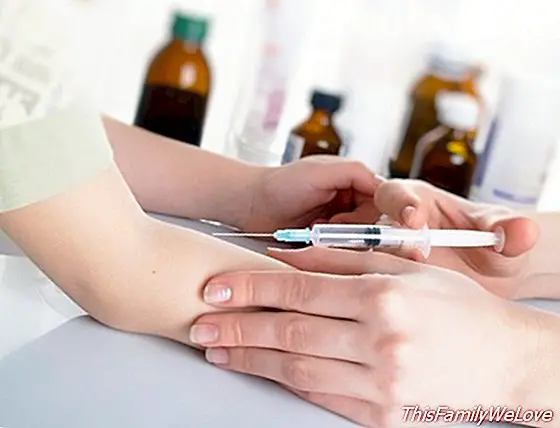Almost 300,000 people ask for protocols to prevent whooping cough in children

The whooping cough is a disease caused by an infection caused by the bacterium Bordetella pertussis, which affects the respiratory system (lungs and airways). In adolescents and adults it is usually milder, but children under 4 months of age are the most vulnerable group, with frequent complications and even mortality.
In Spain, there has been a increase in the disease since 2010, occurring more than 40% of cases in children under one year. This has made a group of parents have launched a petition to ask the Ministry of Health to create a protocol to prevent deaths from this disease.
Almost 300,000 people have already joined this petition launched on Change.org by parents who have been affected by this disease in the worst possible way: they have suffered the loss of a child who is only one month old because of whooping cough. "The first dose of this vaccine is not given to children until 2 months of age, and it is not until 6 months, when they already have 3 doses, when the immunization is really effective", these parents lament.
Death of a child due to whooping cough
In his writing, they tell that his son, a few days after birth, "started with catarrhal symptoms"The first diagnosis that several pediatricians gave us was a mild bronchiolitis, for which we recommended nasal washes with serum and be alert to a possible worsening," they recall, ensuring that during the follow-up of their baby.it evolved well at each visit to the pediatrician".
But nevertheless, with only 27 days of life, these parents began to worry: your baby vomited milk from coughs after coughing. They decided to take him to the Emergency Department, where the pediatricians diagnosed him with bronchiolitis and preferred to enter the plant. "The next morning, and only by way of prevention, They took our son to the ICU to have him more controlled", they continue.
"Immediately they started treating him with both bronchiolitis and whooping cough, Respiratory diseases with very similar symptoms, since the analyzes to determine this last disease are not immediate and they preferred to prevent, "these parents continue in their writing Three nights passed and the baby got worse very fast until he reached the terrible end: he died" despite of constant medical care "."Once a minor develops whooping cough there are no curative medicines, simply palliatives ", they explain.
Pertussis infection
According to these parents, in the majority of cases of babies infected by whooping cough It is a direct family member who passes it on to the child. "Adults are usually sick without knowing it, because this disease develops in a generally mild way in the elderly, to the point that most doctors confuse their symptoms with those of a simple common cold," they clarify.
In this particular case, the carrier was her own mother. She went to the health center a month before her son was born after carrying several weeks with a persistent cough, but she was diagnosed with a cold. "If there had been a protocol of action whereby any pregnant woman received the pertussis vaccine if she had symptoms of the disease, they would have vaccinated her and our son would not have developed it," he says.
Pertussis vaccine
Nowadays the pertussis vaccination varies from community to community, although in general they receive the last dose at 14 years. "In the best of cases, immunity lasts up to 24 years," say these parents.
As they defend, this disparity between autonomous communities is causing thatEvery time there are more cases of adults who get the disease, which can cause them to infect babies when interacting with them. In the case of infants, the disease is "highly dangerous and there are no curative medications," they insist.
In recent years, with the proliferation of cases of whooping cough in developed countries, many medical associations have disclosed the need to promote among pregnant women the so-called 'nest strategy'. "This strategy basically consists of vaccinating the entire environment of that future baby (parents, grandparents, siblings, uncles, caregivers, friends, pediatricians, ...), "clarify these parents, who say that if these vaccinated adults are immune to the bacterium that causes whooping cough," it is very difficult for the baby can get infected. "
This family wanted to learn about this strategy in order to have another baby, but when asking at their health center they discovered that in Spain it is an unknown practice, which has led them to launch this petition for signatures with the aim of establishing an information protocol among doctors who care for pregnant women.
In the opinion of these parents, all mothers should know "the existence of this strategy and its benefits to prevent the spread of pertussis in their babies"Something that will be achieved if the doctors inform them about it." Like they do with the flu vaccine in risk groups, they should inform parents of the benefits of being vaccinated, "they reiterate.
"We urge the different health agencies in the country to train medical doctors about whooping cough, the symptoms it presents and the need to pay special attention to the care provided to pregnant women, so they can inform them about this disease and the way to prevent it routinely in the consultationss ", they write.
In its text, in addition, this family asks for information campaigns "on the need for adults are vaccinated every ten years against whooping cough, the only way to eradicate this disease completely, whose incidence is growing in recent years in our country, to the point of alerting medical societies.
Although the mortality of pertussis is relatively low compared to other diseases, the existence of vaccines to prevent it, the high incidence of infections, and the complications that derive from it, "make it essential to act to prevent it, and thus prevent more babies from suffering its consequences," they conclude.
Angela R. Bonachera




